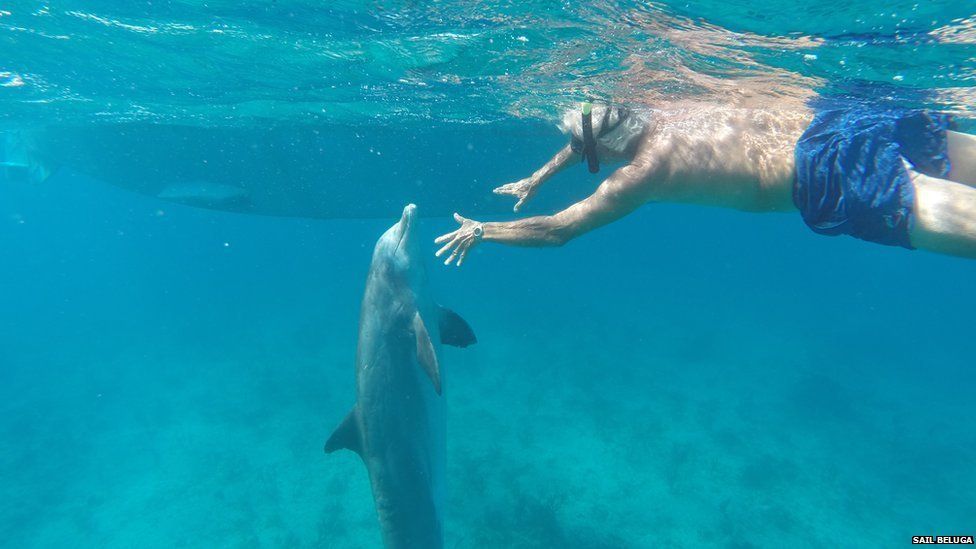Turks and Caicos dolphin park plan meets with opposition
- Published

"They're nothing more than water circuses," Daniel Turner says of dolphinaria, or animal parks featuring dolphins.
Mr Turner is a spokesman for Born Free, a charity which is actively campaigning for the closure of all dolphinaria worldwide.
"These animals have no life worth living in captivity, devoid of any form of stimulation and social interaction, unable to swim hundreds of kilometres a day or live in family groups," he says.
"If people really want to engage with these animals to truly be inspired by their intelligence and see how they live, they need to see them in the wild; there's plenty of opportunity for them to do so."
Many of the million-plus tourists who visit the tiny Caribbean archipelago of Turks and Caicos Islands (TCI) each year hope for just such an encounter with a wild dolphin.
A friendly bottlenose called Jojo has been interacting with people voluntarily since the 1980s and is popular with locals and tourists alike.
Tim Ainley, a tour operator on the TCI island of Providenciales, has been swimming regularly with Jojo since 1985.
He echoes Mr Turner's sentiments.
"You learn nothing about a dolphin watching it jump through hoops," he says.
Haven
Despite a recent popular backlash against sea mammal parks triggered by the documentary Blackfish, which accused SeaWorld of mistreating killer whales, such facilities remain popular in parts of the Caribbean, driven by a thriving cruise industry.
Jamaica-based Dolphin Cove - billed as the island's number one attraction - plans to spend several million dollars rolling out parks across the region.
The company has proposed building attractions on two TCI islands.
TCI has long been considered a haven for wild dolphins and whales with laws forbidding their confinement.
When Dolphin Cove's plans first became public in 2012, a maelstrom of controversy ensued.
Thousands signed a petition demanding the application be thrown out, and planning chiefs were bombarded with more than 100 angry letters from across the globe.
There was further contention when it emerged that the TCI governor had amended regulations to allow marine mammals to be kept for display, exhibition and performance.
At the time, the then Governor, Ric Todd, lauded the economic boost he said would "significantly complement" the British Overseas Territory's tourism offerings.
He is not alone.
Many residents in TCI's sleepy capital island Grand Turk welcome the fiscal stimulation they believe will be triggered by the facility, which recently secured outline planning permission.
'Slavery'
But for its opponents - still staunch after a three-year fight - the real battle is just beginning.
Barbara Young, of environmental non-government organisation Pride, argues that tourists who visit dolphin parks are often ignorant of the animals' plight.
She alleges that dolphins are routinely fed medication to prevent stress-induced ulcers and given regular invasive endoscopies to monitor their condition.
One of the most outspoken critics of building dolphinaria on TCI has come from within government itself.
Former Director of the Department of Environment and Maritime Affairs Kathleen Wood described the "exploitation of dolphins for economic gain" as "the moral equivalent of slavery".
In a letter she sent to the TCI Planning Department last year she recommended the scheme be turned down.
Ms Wood argued that it would have a disastrous effect on the country's image as a green destination and could alienate the growing number of tourists and travel agencies which boycott places that allow marine mammal parks to operate.
She also spoke of the adverse ecological impact it could have on the proposed North Creek site, a critical habitat for 500 greater flamingos, along with conch and mangroves.
'Best in the world'
Globally, marine parks have been slammed for fuelling the trade in capturing wild animals and for high mortality rates among their animals.
Dolphin Cove did not provide a comment, despite repeated requests, but its website describes its facilities as "among the best in the world".
It has operated an in-house breeding programme for several years.
Back in Providenciales, Mr Ainley hopes the campaign by environmentalists and activists will be successful in blocking Dolphin Cove's plans.
"We're so busy exploiting dolphins but if we stopped and listened we'd find they had a lot to teach us instead."
And speaking of JoJo the friendly wild bottlenose, he adds: "This is a fight I know he'd want me to make."
- Published20 February 2013
- Published7 August 2015
- Published13 August 2015